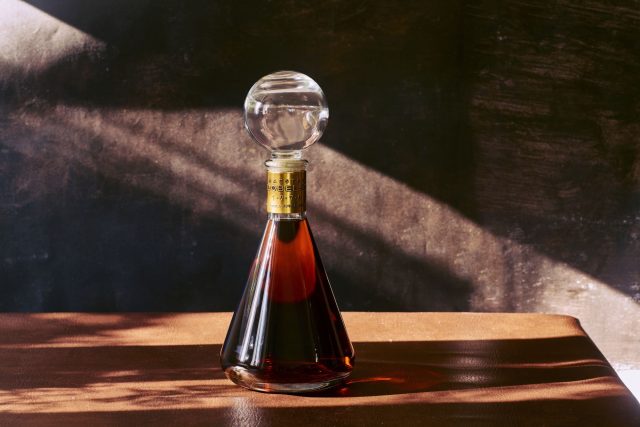Q&A Professor Charles Spence: The Sensuous Drinker
Celebrated Oxford University gastrophysicist, Professor Charles Spence, believes delivering the perfect drink is much like delivering the “perfect meal”, with many factors at play when enacting a great tasting experience, over and above the quality of the product itself. Here, he shares excerpts of his recent report, The Perfect Serve Experience, commissioned by Maestro DOBEL tequila, with Douglas Blyde.

Why does wine taste better on holiday?
While most people are convinced that they can directly taste what is in the glass, and that their impression of the drink would not be influenced by any product-extrinsic factors, everyone has also likely experienced a version of the “Provencal Rosé Paradox” where it tastes wonderful on holiday au bord de la mer in the Mediterranean, but when we open a bottle of the same wine when we are back at home then it tastes somehow disappointing – which highlights the importance of mood, atmosphere, and context to tasting. Crucially, the paradox affects our perception of any product, even a super-premium tequila.
Why is it important to manage expectations when tasting?
Our taste/flavour expectations are set both by sensory cues, such as the rich, dark colour of a drink, as well as from the aroma experienced “orthonasally” when the drink is poured into a glass and nosed. At the same time, however, what we know about a drink, about the way in which it was made, and the brand and price information can also exert a significant impact on the tasting experience. Very often we live in the world of our expectations, tasting what we expect to taste rather than necessarily evaluating the actual taste experience. This is why it is so important to manage the sensory expectations that we have in order to deliver a really great taste experience.

What is in a name?
One might consider how the speech sounds that are present in the brand name can, almost subliminally set taste expectations. Voiced consonants like D, B, and V are associated with heavy and slow. Note how the consonants in DOBEL thus help to set the consumer’s expectations of an intensely flavoured drink.
How important is glassware?
To maximise the tasting pleasure, it really makes sense to know exactly what you want to get from the drink. At the very least, the glassware should be congruent with the category of drink. No matter what you are drinking, rest assured that it simply won’t taste the same if drunk out of a plastic cup. For a premium drink such as Maestro DOBEL, the glass should be heavy, since that weight in the hand has been shown to enhance the experience of the taster. Note that drinking a drink like tequila, one really wants to make the most of its aromatic notes. Research shows that holding something heavy in one’s hand can help to enhance the perceived intensity of the fragrance, bouquet, or aroma. It turns out that we all match shapes with tastes in a way that can seem almost synaesthetic. For instance, most people associate round with sweet, angularity with bitter, sour, and salty. Sour is asymmetric. Simply by serving a drink in a glass having a round rather than straight-sided, has repeatedly been shown to influence taste. Crucially, this all links to Italian Futurists. In fact, everything from the softness of the chair you are sitting on when you drink, to the height of the ceiling (should you find yourself drinking indoors) have all been shown to influence the tasting experience.
What can be done to improve the perception of texture in a drink?
Something as simple as rubbing a piece of sandpaper while drinking Maestro DOBEL tequila will likely bring out the textured aftertaste of the drink. By contrast, try rubbing something round and silky smooth if you want to emphasise the smoothness of this ultra-premium drink instead.
What does colour mean to people?
People are drawn to golden caramel brown colour in drinks such as embodied by Maestro DOBEL tequila, because of the promise that they set of a rich, aged, flavourful taste experience. If the same drink were to appear in a different colour, heaven forbid blue, say, you can be rest assured that people would simply not like the drink anything like as much.
Partner Content

What other factors should be brought to the table?
Being able to taste something of the history and culture associated with an artisanal product such as Maestro DOBEL tequila is an important element in one’s overall enjoyment of the product.
When should we taste?
Despite the fact that professional wine tasters often try to schedule their tasting sessions for 11 am in the morning (because this is when they believe that their flavour senses are working at their best), I would argue that there aren’t many people out there who enjoy drinking alcohol in the morning. In fact, the research shows that we tend to be more adventurous as the day proceeds. Similarly, we are more likely to enjoy ourselves, and choose the more indulgent option later in the week, and also later in the year.
Does music affect our sense of taste?
Professional tasters, such as the famous French oenologist, Émile Peynaud, often suggest that one should taste in silence in order to really be able to concentrate on the taste/flavour of a drink. However, we have conducted various research that shows that people actually enjoy whatever they are drinking significantly more if they are listening to music (than when tasting in silence). We have also repeatedly found that the more you like what you are listening to, the more that you will like whatever it is that you happen to be tasting. So, for example, if you want to bring out the sweeter notes in the tequila then you should search out a track that you like having lots of tinkling high-pitched piano music; alternatively, if it is the more bitter notes that you wish to accentuate then find something very low pitched, and possibly also brassy. To enhance the smoothness of the tequila, go for music that is consonant (melodic and/or harmonic), with legato articulation, and low discontinuity.
Where should we taste?
The venue can carry over to influence our experience of whatever we are tasting. So, for example, being in a classy location, or even watching a classy TV show, something like Succession, for example, has been shown to influence people’s taste responses. There is lots of research to show that our classy associations with classical music often result in us spending more on food and drink. Hence, in order to have the best multisensory tasting experience, you should listen to classy music that you personally really like.
And finally, with whom should we taste?
Research shows that people who eat and/or drink alone typically do not enjoy the taste/flavour anything like as much as those who eat or drink in the company of others. Simply staring at someone who is smiling rather than unhappy, can enhance one’s enjoyment of whatever one happens to be tasting…
Professor Charles Spencer’s full report can be found in full here.
Maestro DOBEL 50 1970 Extra Añejo is available from Hedonism Wines and House of Spirits with an RRP of £2,200, and is exclusively served at The Connaught Bar, Mandarin Oriental, Annabel’s, and Lyaness.
Related news
World cuisine set to boost sales of RTDs
Suntory CEO: Tariff plans prompt broader global investment considerations
Wine and whisky measures fall short in undercover investigation




